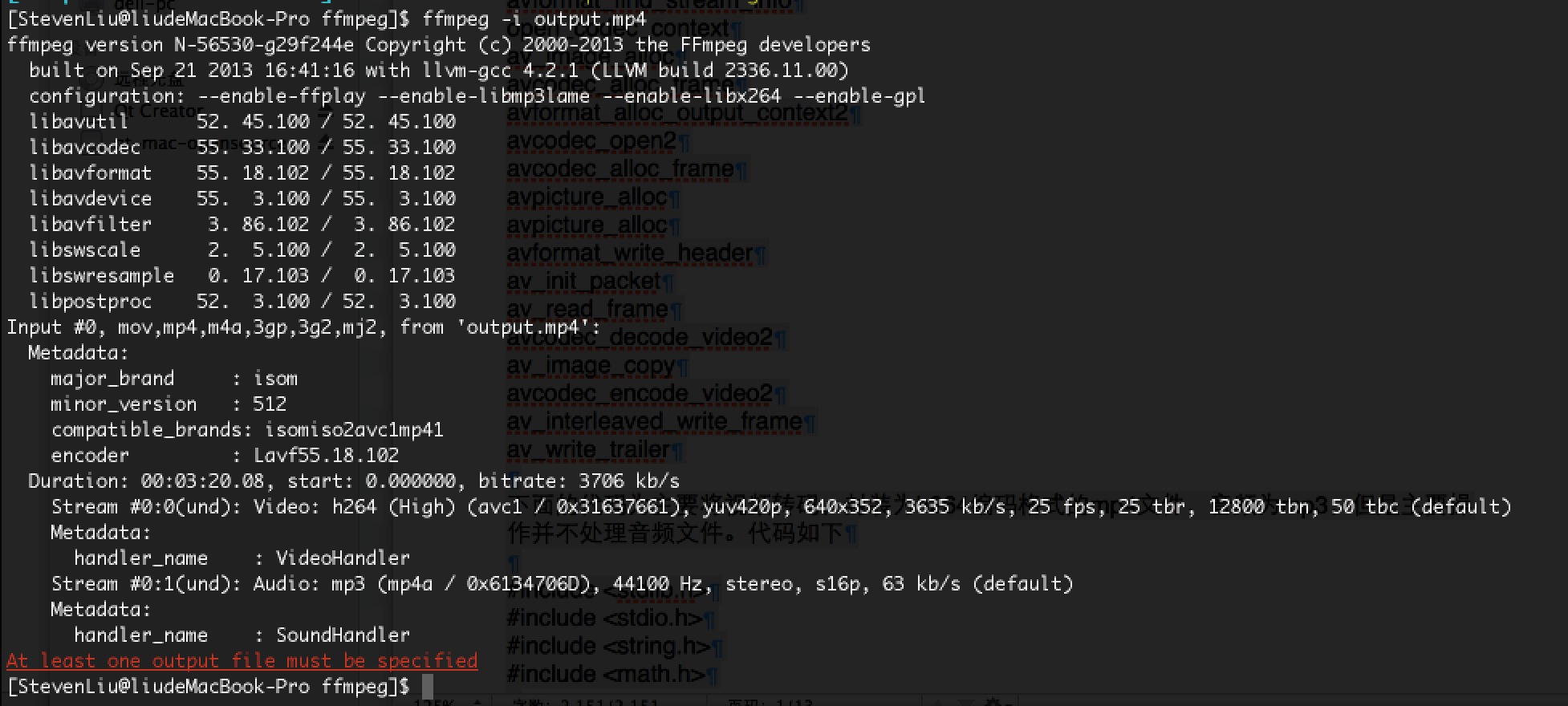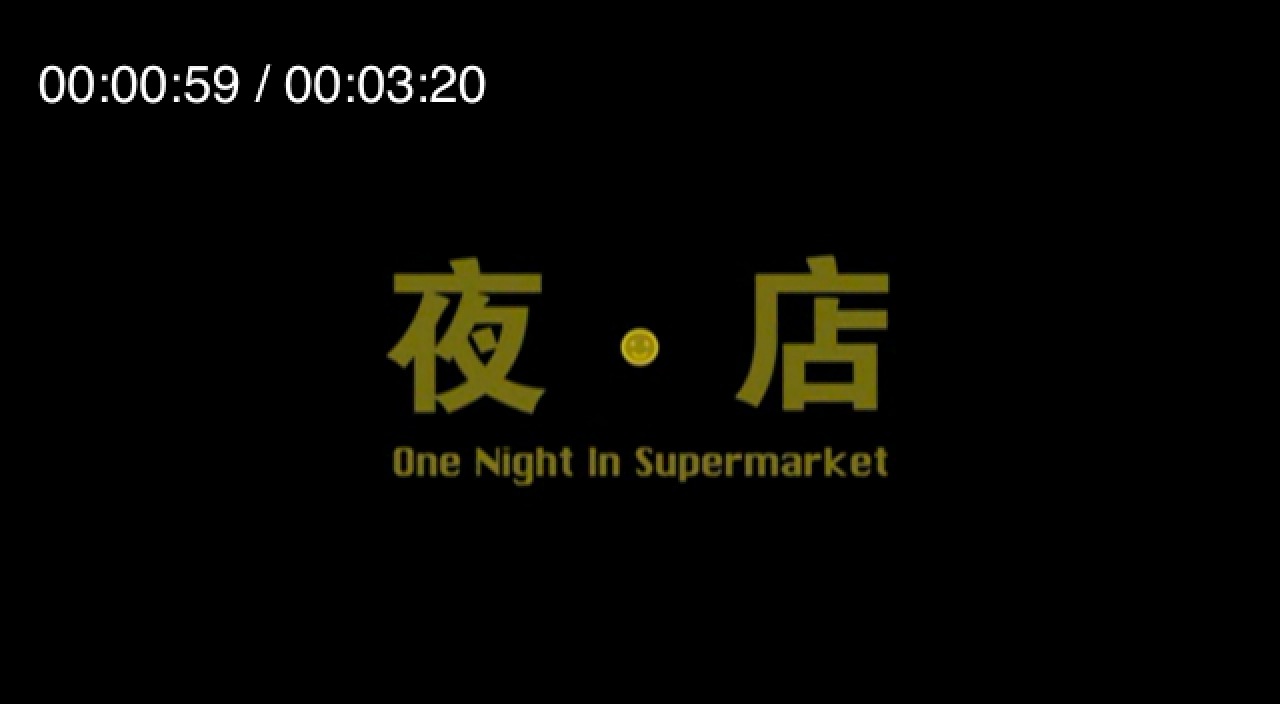linux 上java调用ffmpeg转码只有几秒长
Posted
tags:
篇首语:本文由小常识网(cha138.com)小编为大家整理,主要介绍了linux 上java调用ffmpeg转码只有几秒长相关的知识,希望对你有一定的参考价值。
举个例子:原视频有7M,直接在Linux下执行装换命令是正常的,而用该Java代码执行该命令时视频只能转换1M;而且转换成MP4的时候,视频无法播放。 参考技术A 执行加长时间试试使用ffmpeg实现转码样例(代码实现)
使用ffmpeg实现转码样例(代码实现)
使用ffmpeg转码主要工作如下:
Demux -> Decoding -> Encoding -> Muxing
其中接口调用如下:
av_register_all();
avformat_open_input
avformat_find_stream_info
open_codec_context
av_image_alloc
avcodec_alloc_frame
avformat_alloc_output_context2
avcodec_open2
avcodec_alloc_frame
avpicture_alloc
avpicture_alloc
avformat_write_header
av_init_packet
av_read_frame
avcodec_decode_video2
av_image_copy
avcodec_encode_video2
av_interleaved_write_frame
av_write_trailer
下面的代码为主要将视频转码,封装为h264编码格式的mp4文件,音频为mp3,但是主要操作并不处理音频文件。代码如下
#include <stdlib.h> #include <stdio.h> #include <string.h> #include <math.h> #include <libavutil/opt.h> #include <libavutil/mathematics.h> #include <libavformat/avformat.h> #include <libswscale/swscale.h> #include <libswresample/swresample.h> /* 5 seconds stream duration */ #define STREAM_DURATION 200.0 #define STREAM_FRAME_RATE 25 /* 25 images/s */ #define STREAM_NB_FRAMES ((int)(STREAM_DURATION * STREAM_FRAME_RATE)) #define STREAM_PIX_FMT AV_PIX_FMT_YUV420P /* default pix_fmt */ static AVFormatContext *input_fmt_ctx = NULL; static int sws_flags = SWS_BICUBIC; static AVPacket input_pkt; static int video_stream_idx = -1; static uint8_t *video_dst_data[4] = {NULL}; static int video_dst_linesize[4]; static AVStream *input_video_stream; static AVFrame *input_frame; static AVCodecContext *video_dec_ctx = NULL; static int video_dst_bufsize; static int open_codec_context(int *stream_idx, AVFormatContext *fmt_ctx, enum AVMediaType type) { int ret; AVStream *st; AVCodecContext *dec_ctx = NULL; AVCodec *dec = NULL; ret = av_find_best_stream(fmt_ctx, type, -1, -1, NULL, 0); if (ret < 0) { return ret; } else { *stream_idx = ret; st = fmt_ctx->streams[*stream_idx]; /* find decoder for the stream */ dec_ctx = st->codec; dec = avcodec_find_decoder(dec_ctx->codec_id); if (!dec) { fprintf(stderr, "Failed to find %s codec\\n", av_get_media_type_string(type)); return ret; } if ((ret = avcodec_open2(dec_ctx, dec, NULL)) < 0) { fprintf(stderr, "Failed to open %s codec\\n", av_get_media_type_string(type)); return ret; } } return 0; } /* Add an output stream. */ static AVStream *add_stream(AVFormatContext *oc, AVCodec **codec, enum AVCodecID codec_id) { AVCodecContext *c; AVStream *st; /* find the encoder */ *codec = avcodec_find_encoder(codec_id); if (!(*codec)) { fprintf(stderr, "Could not find encoder for \'%s\'\\n", avcodec_get_name(codec_id)); exit(1); } st = avformat_new_stream(oc, *codec); if (!st) { fprintf(stderr, "Could not allocate stream\\n"); exit(1); } st->id = oc->nb_streams-1; c = st->codec; switch ((*codec)->type) { case AVMEDIA_TYPE_AUDIO: c->sample_fmt = AV_SAMPLE_FMT_FLTP; c->bit_rate = 64000; c->sample_rate = 44100; c->channels = 2; break; case AVMEDIA_TYPE_VIDEO: c->codec_id = codec_id; c->bit_rate = 400000; c->time_base.den = STREAM_FRAME_RATE; c->time_base.num = 1; c->gop_size = 12; c->pix_fmt = STREAM_PIX_FMT; break; default: break; } /* Some formats want stream headers to be separate. */ if (oc->oformat->flags & AVFMT_GLOBALHEADER) c->flags |= CODEC_FLAG_GLOBAL_HEADER; return st; } /**************************************************************/ /* audio output */ static float t, tincr, tincr2; static uint8_t **src_samples_data; static int src_samples_linesize; static int src_nb_samples; static int max_dst_nb_samples; uint8_t **dst_samples_data; int dst_samples_linesize; int dst_samples_size; struct SwrContext *swr_ctx = NULL; static void open_audio(AVFormatContext *oc, AVCodec *codec, AVStream *st) { AVCodecContext *c; int ret; c = st->codec; /* open it */ ret = avcodec_open2(c, codec, NULL); if (ret < 0) { fprintf(stderr, "Could not open audio codec: %s\\n", av_err2str(ret)); exit(1); } /* init signal generator */ t = 0; tincr = 2 * M_PI * 110.0 / c->sample_rate; /* increment frequency by 110 Hz per second */ tincr2 = 2 * M_PI * 110.0 / c->sample_rate / c->sample_rate; src_nb_samples = c->codec->capabilities & CODEC_CAP_VARIABLE_FRAME_SIZE ? 10000 : c->frame_size; ret = av_samples_alloc_array_and_samples(&src_samples_data, &src_samples_linesize, c->channels, src_nb_samples, c->sample_fmt, 0); if (ret < 0) { fprintf(stderr, "Could not allocate source samples\\n"); exit(1); } /* create resampler context */ if (c->sample_fmt != AV_SAMPLE_FMT_S16) { swr_ctx = swr_alloc(); if (!swr_ctx) { fprintf(stderr, "Could not allocate resampler context\\n"); exit(1); } /* set options */ av_opt_set_int (swr_ctx, "in_channel_count", c->channels, 0); av_opt_set_int (swr_ctx, "in_sample_rate", c->sample_rate, 0); av_opt_set_sample_fmt(swr_ctx, "in_sample_fmt", AV_SAMPLE_FMT_S16, 0); av_opt_set_int (swr_ctx, "out_channel_count", c->channels, 0); av_opt_set_int (swr_ctx, "out_sample_rate", c->sample_rate, 0); av_opt_set_sample_fmt(swr_ctx, "out_sample_fmt", c->sample_fmt, 0); /* initialize the resampling context */ if ((ret = swr_init(swr_ctx)) < 0) { fprintf(stderr, "Failed to initialize the resampling context\\n"); exit(1); } } /* compute the number of converted samples: buffering is avoided * ensuring that the output buffer will contain at least all the * converted input samples */ max_dst_nb_samples = src_nb_samples; ret = av_samples_alloc_array_and_samples(&dst_samples_data, &dst_samples_linesize, c->channels, max_dst_nb_samples, c->sample_fmt, 0); if (ret < 0) { fprintf(stderr, "Could not allocate destination samples\\n"); exit(1); } dst_samples_size = av_samples_get_buffer_size(NULL, c->channels, max_dst_nb_samples, c->sample_fmt, 0); } /* Prepare a 16 bit dummy audio frame of \'frame_size\' samples and * \'nb_channels\' channels. */ static void get_audio_frame(int16_t *samples, int frame_size, int nb_channels) { int j, i, v; int16_t *q; q = samples; for (j = 0; j < frame_size; j++) { v = (int)(sin(t) * 10000); for (i = 0; i < nb_channels; i++) *q++ = v; t += tincr; tincr += tincr2; } } static void write_audio_frame(AVFormatContext *oc, AVStream *st) { AVCodecContext *c; AVPacket pkt = { 0 }; // data and size must be 0; AVFrame *frame = avcodec_alloc_frame(); int got_packet, ret, dst_nb_samples; av_init_packet(&pkt); c = st->codec; get_audio_frame((int16_t *)src_samples_data[0], src_nb_samples, c->channels); /* convert samples from native format to destination codec format, using the resampler */ if (swr_ctx) { /* compute destination number of samples */ dst_nb_samples = av_rescale_rnd(swr_get_delay(swr_ctx, c->sample_rate) + src_nb_samples, c->sample_rate, c->sample_rate, AV_ROUND_UP); if (dst_nb_samples > max_dst_nb_samples) { av_free(dst_samples_data[0]); ret = av_samples_alloc(dst_samples_data, &dst_samples_linesize, c->channels, dst_nb_samples, c->sample_fmt, 0); if (ret < 0) exit(1); max_dst_nb_samples = dst_nb_samples; dst_samples_size = av_samples_get_buffer_size(NULL, c->channels, dst_nb_samples, c->sample_fmt, 0); } /* convert to destination format */ ret = swr_convert(swr_ctx, dst_samples_data, dst_nb_samples, (const uint8_t **)src_samples_data, src_nb_samples); if (ret < 0) { fprintf(stderr, "Error while converting\\n"); exit(1); } } else { dst_samples_data[0] = src_samples_data[0]; dst_nb_samples = src_nb_samples; } frame->nb_samples = dst_nb_samples; avcodec_fill_audio_frame(frame, c->channels, c->sample_fmt, dst_samples_data[0], dst_samples_size, 0); ret = avcodec_encode_audio2(c, &pkt, frame, &got_packet); if (ret < 0) { fprintf(stderr, "Error encoding audio frame: %s\\n", av_err2str(ret)); exit(1); } if (!got_packet) return; pkt.stream_index = st->index; /* Write the compressed frame to the media file. */ ret = av_interleaved_write_frame(oc, &pkt); if (ret != 0) { fprintf(stderr, "Error while writing audio frame: %s\\n", av_err2str(ret)); exit(1); } avcodec_free_frame(&frame); } static void close_audio(AVFormatContext *oc, AVStream *st) { avcodec_close(st->codec); av_free(src_samples_data[0]); av_free(dst_samples_data[0]); } /***********************bbs.ChinaFFmpeg.com****孙悟空***********************/ /* video output */ static AVFrame *frame; static AVPicture src_picture, dst_picture; static int frame_count; static void open_video(AVFormatContext *oc, AVCodec *codec, AVStream *st) { int ret; AVCodecContext *c = st->codec; /* open the codec */ ret = avcodec_open2(c, codec, NULL); if (ret < 0) { fprintf(stderr, "Could not open video codec: %s\\n", av_err2str(ret)); exit(1); } /* allocate and init a re-usable frame */ frame = avcodec_alloc_frame(); if (!frame) { fprintf(stderr, "Could not allocate video frame\\n"); exit(1); } /* Allocate the encoded raw picture. */ ret = avpicture_alloc(&dst_picture, c->pix_fmt, c->width, c->height); if (ret < 0) { fprintf(stderr, "Could not allocate picture: %s\\n", av_err2str(ret)); exit(1); } /* If the output format is not YUV420P, then a temporary YUV420P * picture is needed too. It is then converted to the required * output format. */ if (c->pix_fmt != AV_PIX_FMT_YUV420P) { ret = avpicture_alloc(&src_picture, AV_PIX_FMT_YUV420P, c->width, c->height); if (ret < 0) { fprintf(stderr, "Could not allocate temporary picture: %s\\n", av_err2str(ret)); exit(1); } } /* copy data and linesize picture pointers to frame */ *((AVPicture *)frame) = dst_picture; } static void write_video_frame(AVFormatContext *oc, AVStream *st) { int ret; static struct SwsContext *sws_ctx; AVCodecContext *c = st->codec; // fill_yuv_image(&dst_picture, frame_count, c->width, c->height); if (oc->oformat->flags & AVFMT_RAWPICTURE) { /* Raw video case - directly store the picture in the packet */ AVPacket pkt; av_init_packet(&pkt); pkt.flags |= AV_PKT_FLAG_KEY; pkt.stream_index = st->index; pkt.data = dst_picture.data[0]; pkt.size = sizeof(AVPicture); ret = av_interleaved_write_frame(oc, &pkt); } else { AVPacket pkt = { 0 }; int got_packet; av_init_packet(&pkt); /* encode the image */ ret = avcodec_encode_video2(c, &pkt, frame, &got_packet); if (ret < 0) { fprintf(stderr, "Error encoding video frame: %s\\n", av_err2str(ret)); exit(1); } /* If size is zero, it means the image was buffered. */ if (!ret && got_packet && pkt.size) { pkt.stream_index = st->index; /* Write the compressed frame to the media file. */ ret = av_interleaved_write_frame(oc, &pkt); } else { ret = 0; } } if (ret != 0) { fprintf(stderr, "Error while writing video frame: %s\\n", av_err2str(ret)); exit(1); } frame_count++; } static void close_video(AVFormatContext *oc, AVStream *st) { avcodec_close(st->codec); av_free(src_picture.data[0]); av_free(dst_picture.data[0]); av_free(frame); } /**************************************************************/ /* media file output */ int main(int argc, char **argv) { const char *filename; const char *input_file; AVOutputFormat *fmt; AVFormatContext *oc; AVStream *audio_st, *video_st; AVCodec *audio_codec, *video_codec; double audio_time, video_time; int ret; int decoded; int got_frame; /* Initialize libavcodec, and register all codecs and formats. */ av_register_all(); if (argc != 3) { printf("usage: %s output_file inputfile\\n" "API example program to output a media file with libavformat.\\n" "This program generates a synthetic audio and video stream, encodes and\\n" "muxes them into a file named output_file.\\n" "The output format is automatically guessed according to the file extension.\\n" "Raw images can also be output by using \'%%d\' in the filename.\\n" "\\n", argv[0]); return 1; } input_file = argv[2]; filename = argv[1]; if (avformat_open_input( &input_fmt_ctx, input_file, NULL, NULL) < 0) { fprintf(stderr, "Could not open source file %s\\n", input_file); exit(-1); } /* retrieve stream information */ if (avformat_find_stream_info(input_fmt_ctx, NULL) < 0) { fprintf(stderr, "Could not find stream information\\n"); exit(1); } if (open_codec_context(&video_stream_idx, input_fmt_ctx, AVMEDIA_TYPE_VIDEO) >= 0) { input_video_stream = input_fmt_ctx->streams[video_stream_idx]; video_dec_ctx = input_video_stream->codec; ret = av_image_alloc(video_dst_data, video_dst_linesize, video_dec_ctx->width, video_dec_ctx->height, video_dec_ctx->pix_fmt, 1); if (ret < 0) { fprintf(stderr, "Could not allocate raw video buffer\\n"); } video_dst_bufsize = ret; } input_frame = avcodec_alloc_frame(); if (!input_frame) { fprintf(stderr, "Could not allocate frame\\n"); ret = AVERROR(ENOMEM); exit(-1); } /* allocate the output media context */ avformat_alloc_output_context2(&oc, NULL, NULL, filename); if (!oc) { printf("Could not deduce output format from file extension: using MPEG.\\n"); avformat_alloc_output_context2(&oc, NULL, "mpeg", filename); } if (!oc) { return 1; } fmt = oc->oformat; video_st = NULL; audio_st = NULL; fmt->video_codec = AV_CODEC_ID_H264; if (fmt->video_codec != AV_CODEC_ID_NONE) { video_st = add_stream(oc, &video_codec, AV_CODEC_ID_H264); } if (video_st->codec) { video_st->codec->width = video_dec_ctx->width; video_st->codec->height = video_dec_ctx->height; } fmt->audio_codec = AV_CODEC_ID_MP3; if (fmt->audio_codec != AV_CODEC_ID_NONE) { audio_st = add_stream(oc, &audio_codec, AV_CODEC_ID_MP3); } /* Now that all the parameters are set, we can open the audio and * video codecs and allocate the necessary encode buffers. */ if (video_st) open_video(oc, video_codec, video_st); if (audio_st) open_audio(oc, audio_codec, audio_st); av_dump_format(oc, 0, filename, 1); /* open the output file, if needed */ if (!(fmt->flags & AVFMT_NOFILE)) { ret = avio_open(&oc->pb, filename, AVIO_FLAG_WRITE); if (ret < 0) { fprintf(stderr, "Could not open \'%s\': %s\\n", filename, av_err2str(ret)); return 1; } } /* Write the stream header, if any. */ ret = avformat_write_header(oc, NULL); if (ret < 0) { fprintf(stderr, "Error occurred when opening output file: %s\\n", av_err2str(ret)); return 1; } av_init_packet(&input_pkt); input_pkt.data = NULL; input_pkt.size = 0; if (frame) frame->pts = 0; for (;;) { /* Compute current audio and video time. */ audio_time = audio_st ? audio_st->pts.val * av_q2d(audio_st->time_base) : 0.0; video_time = video_st ? video_st->pts.val * av_q2d(video_st->time_base) : 0.0; if ((!audio_st || audio_time >= STREAM_DURATION) && (!video_st || video_time >= STREAM_DURATION)) break; /* write interleaved audio and video frames */ if (!video_st || (video_st && audio_st && audio_time < video_time)) { write_audio_frame(oc, audio_st); } else { av_read_frame(input_fmt_ctx, &input_pkt); decoded = input_pkt.size; if (input_pkt.stream_index == video_stream_idx) { /* decode video frame */ ret = avcodec_decode_video2(video_dec_ctx, input_frame, &got_frame, &input_pkt); if (ret < 0) { fprintf(stderr, "Error decoding video frame\\n"); return ret; } if (got_frame) { av_image_copy(&dst_picture, video_dst_linesize, (const uint8_t **)(input_frame->data), input_frame->linesize, video_dec_ctx->pix_fmt, video_dec_ctx->width, video_dec_ctx->height); } } write_video_frame(oc, video_st); frame->pts += av_rescale_q(1, video_st->codec->time_base, video_st->time_base); } } av_write_trailer(oc); /* Close each codec. */ if (video_st) close_video(oc, video_st); if (audio_st) close_audio(oc, audio_st); if (!(fmt->flags & AVFMT_NOFILE)) avio_close(oc->pb); avformat_free_context(oc); av_free(input_frame); av_free(video_dst_data[0]); avcodec_close(video_dec_ctx); return 0; }
以上代码为从dox/example/muxing.c中修改得到
编译命令如下:
gcc -g doc/examples/muxing.c -o muxing -lavcodec -lavdevice -lavfilter -lavformat -lavutil -lswscale -lswresample -lpostproc -lx264 -lmp3lame -lz -liconv -lbz2
执行命令如下:
./muxing output.mp4 ~/Movies/input.avi
执行后效果如下:

查看转码完成后的多媒体文件的信息:

查看转码后的文件的视频:

以上是关于linux 上java调用ffmpeg转码只有几秒长的主要内容,如果未能解决你的问题,请参考以下文章